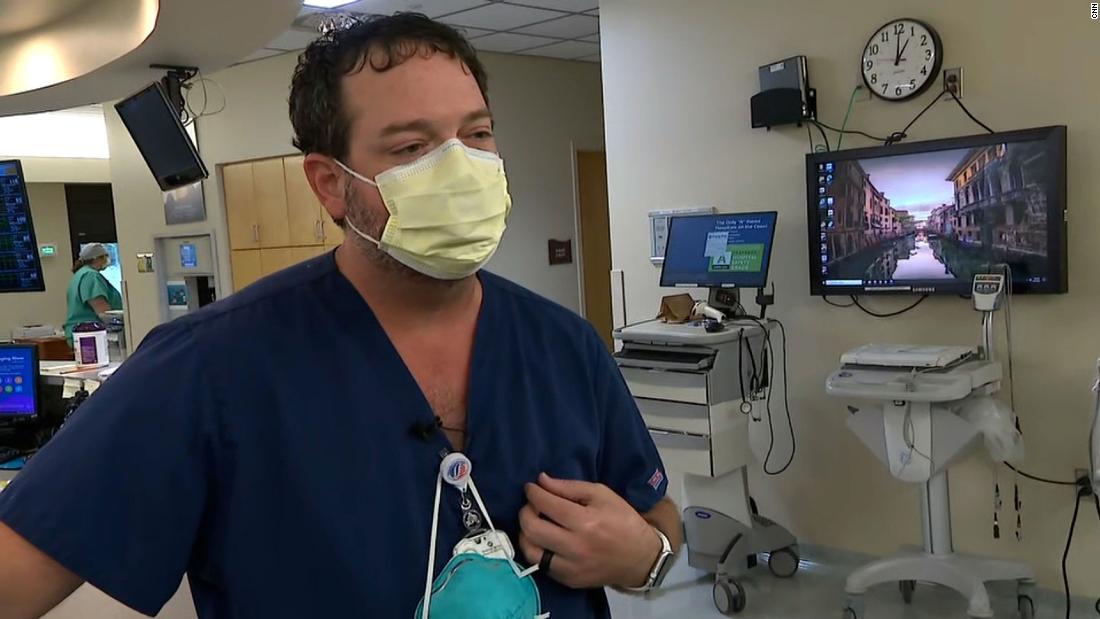Mississippi now has at least 2,000 fewer nurses than it did at the beginning of the year. The state’s hospital system is strained and overwhelmed by Covid.
“It looks heroic,” Atherton, of Singing River Ocean Springs Hospital, told CNN. “But that’s not what it is. It’s sweaty and hard and chaotic and bloody. And it’s hard to live in this every day and then go home and live a normal life.”
Mississippi now has at least 2,000 fewer nurses than it did at the beginning of the year, according to the Mississippi Hospital Association’s Center for Quality & Workforce. The staff shortages add to the growing strain on the state’s hospital system — both due, in large part, to the Covid-19 pandemic.
When asked if the health care system is reaching a breaking point, Singing River Nursing Manager for Personal Care Buddy Grager said, “I think we already broke.”
The head of the Singing River Hospital System, Lee Bond, is urging the state to use some of its $1.8 billion in Covid relief for retention bonuses in hopes of keeping some of the nurses who are turning to leave.
“Do I think it’s going to fix the problem? A lot of nurses have told me it’s not about the money at this point. It’s about, ‘I need to recharge my battery,'” said Dr. Randy Roth, Chief Medical Officer of Singing River Health System.
Saying goodbye to her colleagues, Atherton felt that she couldn’t leave them in the thick of the chaos and chose to put her resignation on hold and cut back her hours instead. But she isn’t the only nurse to consider leaving.
Melissa Davis has worked as nurse in the Singing River Pascagoula ICU for 17 years, but she told CNN she had never felt burnout quite like that from the Covid-19 pandemic. And as a result, nurses are leaving she never thought would.
“It’s hard to see a 34-year-old with a family not make it,” she said through tears. “You can’t describe that.”
For Atherton, fewer staff and more critical Covid-19 patients also mean more tough decisions. There have been moments when two critical patients are in crisis at once, and she has to decide which room to run to first, because there aren’t enough nurses and respiratory therapists to respond to both.
Singing River Health System currently has more than 160 nursing vacancies, Media Relations Director Sarah Duffey said. Since the start of the pandemic, 289 nurses have left.
Some reinforcements are on the way. Mississippi Gov. Tate Reeves said Tuesday that more than 1,000 health care workers have arrived to help with hospital staffing shortages across the state.
Reeves said 808 nurses, three certified registered nurse anesthetists, 22 Nurse Practitioners, 193 respiratory therapists and 20 paramedics are among health care personnel deployed Tuesday morning to 50 hospitals.
“We have been working around the clock to secure additional medical personnel through both federal and private sector sources to shore up the staffing shortage that our hospitals find themselves in. Getting boots on the ground this quickly is a step in the right direction,” Reeves said during a news conference Tuesday.
Duffey told CNN the state has committed to sending 53 RNs 18 and respiratory therapists to its three Gulf Coast hospitals. She hopes the first will arrive by the end of the week.
CNN’s Gregory Lemos contributed to this report.
![]()


